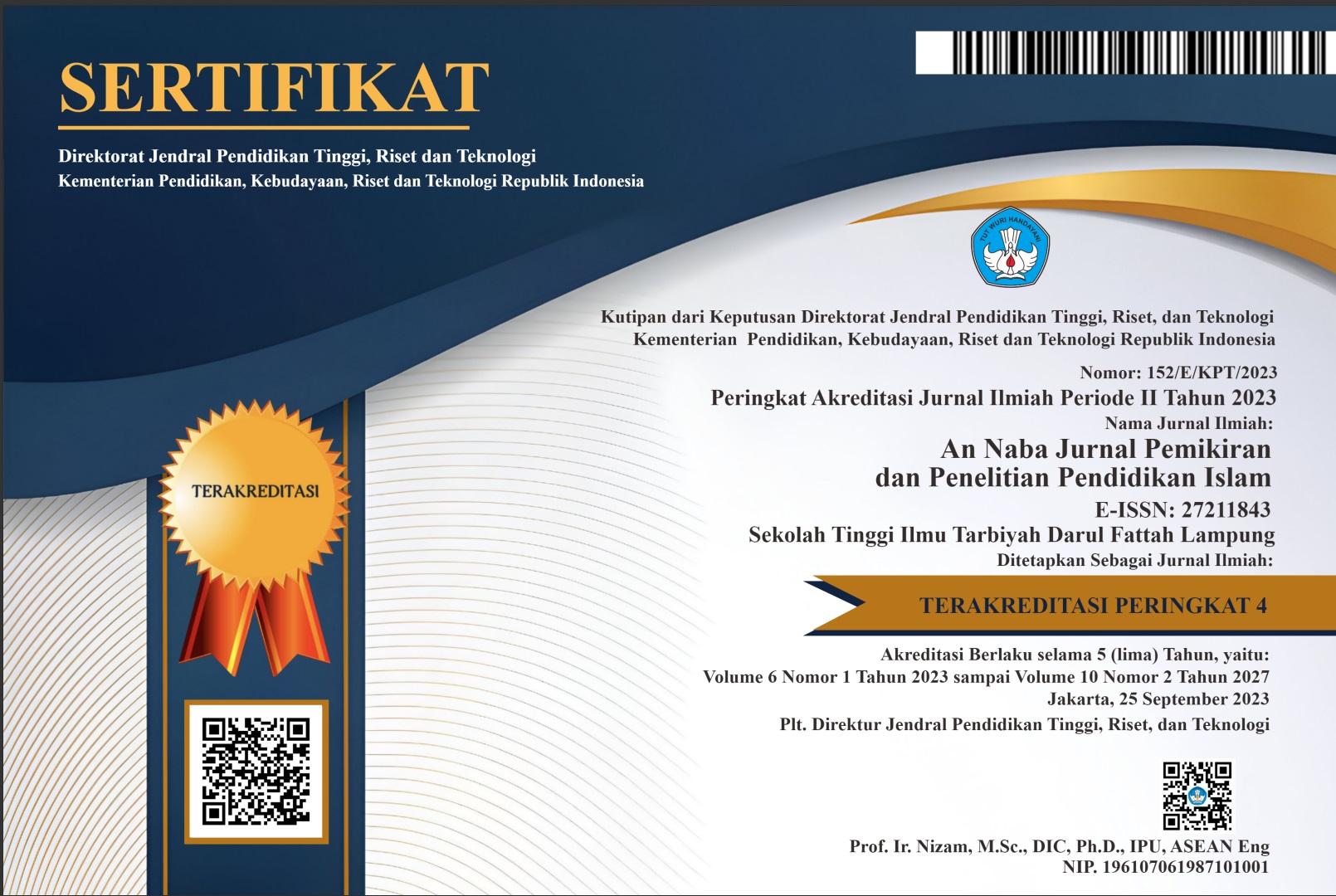THE ROLE OF PARENTS IN DEVELOPING CHILDREN'S NATURE THROUGH LOVE IN ERA 4.0
DOI:
https://doi.org/10.51614/annaba.v4i2.87Keywords:
Parents, Children's Fitrah, Implications of Children's Fitrah in Era 4.0Abstract
The impact of changing times is so great, such as the 4.0 era as it is today for children, teenagers, and parents, who need to adapt to the current era. And it would be nice for us to provide an overview and understanding to our children in a way that is appropriate for their age in order to be able to grasp what we mean. And we should educate more with tenderness and love, the position of parents in developing children's nature, the implications of which in the 4.0 era are very important because with that we can be closer and easier in providing education. The educational method that we use may be done in realizing a disciplined and independent child's personality which stems from the child's desire to achieve happiness in the world and the hereafter. This research method is library research with the object of the verses of the Qur'an using several interpretations from the commentators including: Tafsir Jalalain Tafsir Ibn Kathir Tafsir Al-Maraghi to uncover and explore the Position of Parents in the Al-Qur'an, Role Parents in Developing Children's Fitrah, and Implications of the Role of Parents in Developing Children's Fitrah in the 4.0 era. The results of the study show that 1) The view of Islamic education regarding the nature of the child means that the position of the child has two opposing sides. One side of the child is the trust of Allah entrusted to the parents. On the other hand, children are nature for the lives of parents in particular and society and the environment in general. 2) The implications of the position of parents in developing children's nature, the implications of which in the 4.0 era are a necessity, as mufassir views and opinions Salaf scholars have different opinions in interpreting the word fitrah, the majority argue that the meaning of fitrah is Islam. So that it has become a joint obligation for parents to maintain the mandate of Allah SWT in the form of children, which in the 4.0 era children must be monitored and supervised to ensure that the child's behavior (behavior) as a child who was born naturally (good) in origin.
References
Alim, M. (2006). Pendidikan Agama Islam. Bandung: Rosda Karya.
Dariyo, A. (2013). Dasar-dasar Paedagogi Modern. Jakarta: Indeks.
Fahimah, I. (2019). Kewajiban Orang Tua terhadap Anak dalam Perspektif Islam. Jurnal Hawa : Studi Pengarus Utamaan Gender Dan Anak, 1(1), Article 1. https://doi.org/10.29300/hawapsga.v1i1.2228
Gunawan, H. (2012). Kurikulum dan Pembelajaran Pendidikan Agama Islam. Bandung: Alfabet.
Katsir, I. I. (2007). Tafsir Ibn Katsir. Beirut: Dar el Fikr.
Kharomen, A. I. (2019). Kedudukan Anak dan Relasinya dengan Orang Tua Perspektif Al-Qur’an. Andragogi: Jurnal Diklat Teknis Pendidikan dan Keagamaan, 7(2), 199–214. https://doi.org/10.36052/andragogi.v7i2.88
Maraghi, I. A. (2001). Tafsir al Maraghi. Beirut: Dar el Fikr.
Moleong, L. J. (2005). Metodelogi Penelitian Kualitatif (20th ed.). Remaja Rosdakarya.
Mustaqim, A. (2005). Menjadi Orangtua Bijak, Solusi Kreatif Menangani Pelbagai Masalah Pada Anak. Bandung: Al-Bayan Mizan.
Nikmah, L. (2017). Penafsiran Ṭāhir Ibn ‘Āsyūr Terhadap Ayat-ayat tentang Demokrasi: Kajian atas Tafsir al-Taḥrīr wa al-Tanwīr. Journal of Islamic Studies and Humanities, 2(1), 79–103. https://doi.org/10.21580/jish.21.2517
Priatmoko, S. (2018). Memperkuat Eksistensi Pendidikan Islam Di Era 4.0. TA’LIM : Jurnal Studi Pendidikan Islam, 1(2), 221–239.
Rumiati, R., Purbayani, S. F., Irmawati, T., & Hidayah, R. (2019). Urgency of Parents as Smart Parenting Against Child Education in The Industrial Revolution Era 4.0. Social, Humanities, and Educational Studies (SHEs): Conference Series, 2(1), 376–381. https://doi.org/10.20961/shes.v2i1.38436
Sututhi, I. L. as-. (2004). Tafsir Jalalain. Beirut: Dar el Fikr.
Syaibany, O. A.-T. A.-. (1979). Falsafah Pendidikan Islam. Jakarta: Bulan-Bintang.
Umroh, I. L. (2019). Peran orang tua dalam mendidik anak sejak dini secara islami di era milenial 4.0. Ta’lim : Jurnal Studi Pendidikan Islam, 2(2), 208–225.
Uyuni, Y. R. (2019). Konsep pola asuh orang tua dalam perspektif islam terhadap tumbuh kembang anak dalam keluarga. As-Sibyan: Jurnal Pendidikan Anak Usia Dini, 4(1), 53–62. https://doi.org/10.32678/as-sibyan.v4i1.1964














.png)




